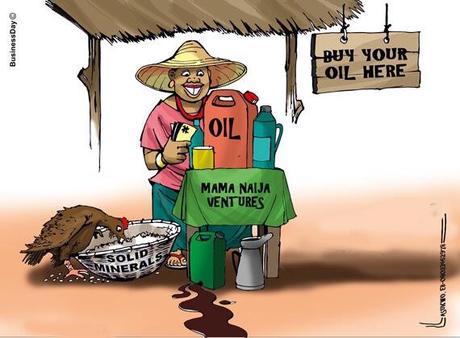
Source: Newswire NGR
By Otito Greg-Obi
On May 20th, 2015 the lights went out in Nigeria, Africa’s biggest oil producer. Nigeria suffers from a phenomenon known as the curse of oil which is a subset of a larger issue known as the resource curse. The idea behind the curse of oil is that countries with large oil reserves cannot seem to manage revenues in a way that benefits the majority of the population economically and socially. Some of the symptoms of the curse of oil include lack of economic diversification, revenue volatility, inability to provide public goods and services, corruption, government inefficiency and the Dutch Disease.
As soon as the massive fuel shortage in Nigeria struck, numerous businesses and banks shut down. Power outages also affected common households because neighborhoods are typically powered by individually owned generators due to inconsistent provision of public utilities. As soon as licensed gas stations closed down, black market vendors looking to make a quick Naira (Nigeria’s currency) began selling low quality oil at exorbitant prices. The shortage exemplifies the curse of oil by revealing an inability to provide a crucial public good. Furthermore, the shortage unveils the existence of corruption in black market practices.
Oil importers shut down operations claiming that the government owed them $2 billion. Nigeria’s Minister of Finance Okonjo-Iweala countered that importers misrepresented the debt in an attempt to recover lost revenue from the recent decrease in value of the Naira due to global declining oil prices. The global decrease of oil prices is a perfect example of the volatility that comes with the curse of oil and how it can complicate economic transactions between the governments and oil corporations.
Fortunately, oil suppliers and distributors eventually met with the government for negotiations that put an end to the crisis. The specifics of the negotiations have not been revealed but it appears that the crisis has been averted for now. But as global oil prices continue to decline, economic shocks are imminent. What will the government do to thwart the curse of oil?
Public private dialog can provide the answer. Since 2008, CIPE has partnered with the Enugu Coalition of Business and Professional Associations (ECOBPA) as well as the Enugu Chamber of Commerce, Industry, Mines and Agriculture (ECCIMA) to help solve issues that arise between the public and private sector. One of the notable outcomes of CIPE’s work in Enugu was the agreement to establish an Alternative Dispute Resolution mechanism. Such a tool would be extremely helpful in the oil sector in order to mitigate disputes between the government and oil importers and hopefully prevent disputes from reaching the point of sudden fuel shortages.
Another solution could be democratic governance devoid of corruption. However, the relationship between the resource curse and democratic governance is a complex one. In his book The Oil Curse, How Petroleum Shapes the Development of Nations, Michael Ross studies democratic transitions and oil. The study shows that from 1960-2006 oil rich authoritarian states were 40 percent less likely to transition to democracy than non-oil producing countries.
When it comes to democratization, the threat in oil lies in its ability to provide an alternate source of revenue to taxes. Since the government does not depend on the broader population for its financing, there is less incentive for democratization. The reason for this lack of incentive is that democratization creates transparency and accountability in public goods provision which authoritarian governments tend to hide from.
Counterintuitively, Ross’ studies also show that oil rich countries actually spend twice as much revenue on public goods provision than countries in democratic transition. The reason is that authoritarian governments use public goods to gain support of the masses as way to either pre-empt or squelch cries for reform. For example, in response to the Arab Spring, oil rich countries immediately rolled out new subsidies for citizens.
So is the solution for Nigeria to revert to authoritarianism? Well, of course not. Far too often, scholars point to oil rich countries like Canada and Norway and say “if they can do it why can’t you?” But since the national histories, economic landscapes, and political climates are vastly different, it is certainly more helpful to take look at African examples instead.
In his book The Bottom Billion, Paul Collier discusses the resource curse and authoritarianism as well. One of the examples he uses of possible coexistence between resources and democracy is Botswana. Botswana could have been utterly crushed by the resource curse phenomenon due to its affluence in diamond deposits. But on the contrary, Botswana has been a democracy since independence.
Bear in mind that its political system is not without flaws. Even though all the elections are consistent they are not necessarily competitive which raises some cause for concern. However, the point is that in comparison to its neighbors, Botswana is thriving as a middle-income country with a relatively stable democracy. As an oil rich country with the largest economy in Africa, Nigeria has the potential to continue to rise and advance as a nation. Perhaps one of the many ways to facilitate improvement is to consult peers like Botswana for guidance.
In the April elections, President Muhammadu Buhari campaigned on a platform of poverty reduction and anti-corruption. In his inaugural speech, Buhari stated that the “past is prologue.” Although it will take time, one can only hope that fuel shortages such as this one will soon serve as a prologue that summons enough motivation for the collaborative reform needed to finally break the spell of the wretched curse of oil.
Otito Greg-Obi is a CIPE intern for Knowledge Management. She is a rising junior at University of Pennsylvania.

